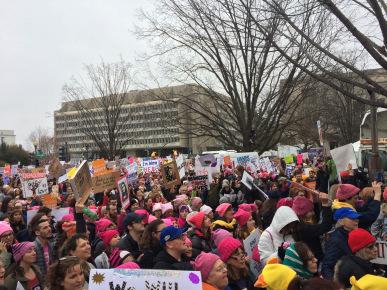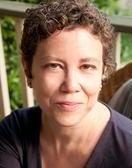
Women’s March, Washington DC, 2017 Photo Susan Katz Miller
On Saturday, my daughter and I joined in the fierce and ecstatic experience of the Women’s March on Washington. Although my mother died four months ago, I felt we carried her with us–that we were marching for all three generations of women from our interfaith family.
I have always been an activist. I testify at city and county council meetings, I call elected officials, I support progressive non-profits, I march. For me, this work is spiritual work. Rabbi Abraham Joshua Heschel, after marching in Selma with Martin Luther King Jr., wrote that while he marched, “my feet were praying.”
But what does all this have to do with being from an interfaith family? Growing up in an interfaith family is a constant reminder that love wins. I’m talking here not about love in the abstract, but radical love between two individuals who are face to face and committed to engaging with each other for the long term. In an interfaith family–or an interracial or intercultural or LGBTQ family–we live with the idea that love vaults over boundaries, love challenges prejudice, love wins over hate.
Part of my work now involves amplifying the voices of people from interfaith families who are speaking out for love: interfaith leaders, interfaith peacemakers, interfaith activists. Our commitment to love comes from the gut, fueled by our most intimate full-time reality, informed by our family experiences.
Perhaps the idea of interfaith family members inspired to be interfaith activists sounds like a tiny niche platform to you. But this is #GenerationInterfaith. Pew Research recently found that one in five Americans grew up in an interfaith family, but that is just the start. If you live in a metropolitan area, and your family has been in the US for at least a generation, you probably have a partner, parent, child, sibling, aunt, uncle, grandparent, step-grandparent, half-sibling, or beloved-neighbor-you-consider family, with a different set of religious beliefs or practices from your own. Not to mention the idea that every family is an interfaith family, in the sense that no two people have identical religious beliefs, practices, traditions, histories, or experiences. Even a partnership between two atheists is going to be informed by the plural religious histories of parents and grandparents, and by cultural traits derived from those various religious traditions.
In this sense, we are all from extended interfaith families. And we can all draw inspiration and motivation from those family ties. Those ties impel me to stand up against anti-Semitism and Islamophobia, to stand up for refugees and immigrants, and to advocate for interfaith literacy. And by extension, because love wins, and because my interfaith lens helps me to become more aware of the complex intersectionality of identity, I stand up for other marginalized communities including LGBTQ people, people of all abilities, and #BlackLivesMatter.
And so, together, let us march.
Susan Katz Miller is the author of Being Both: Embracing Two Religions in One Interfaith Family, from Beacon Press. She works as an interfaith families consultant, speaker, and coach. Follow her on twitter @susankatzmiller.

